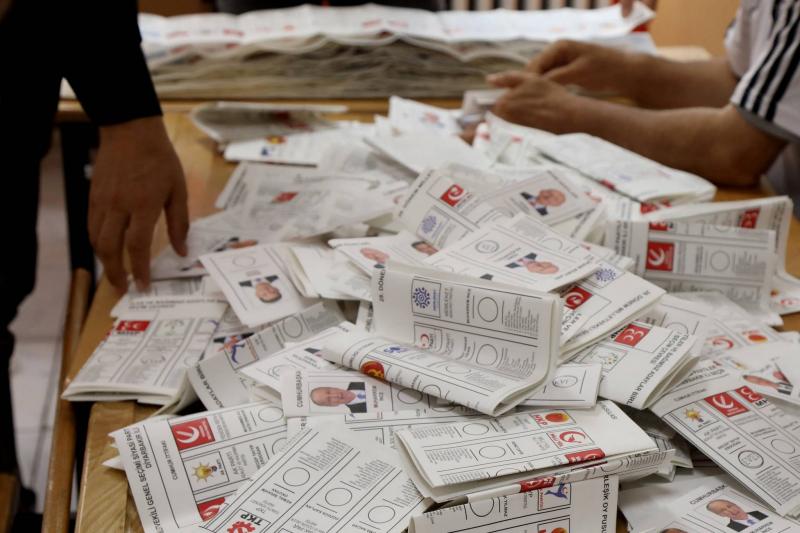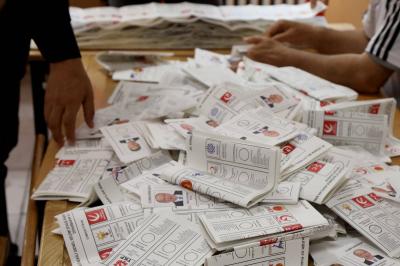Since the announcement of the results from the first round of the Turkish presidential elections, preparations for the second round have begun, as neither Recep Tayyip Erdogan nor his rival Kemal Kilicdaroglu secured enough votes to confirm victory in the first round, which requires over 50% plus one vote. Erdogan received 49.5%, while secular competitor Kilicdaroglu garnered 44.89%.
The elections held last Sunday are described as the most significant Turkey has experienced in the post-Ottoman era, particularly as Erdogan's rule has been shaken for the first time in twenty years, having held power since 2003 and not losing more than ten national elections. With the world awaiting the results of the second round on May 28, there are conflicting opinions; some believe it will favor Kilicdaroglu, while others think the close result paves the way for Erdogan to extend his presidency for another five years. Both candidates rely on the votes of the third candidate, Sinan Ogan, who unexpectedly received 5.17% of the votes, contradicting polls that only predicted around 2%. Therefore, Ogan’s voter base will significantly influence the result of the second round. Additionally, Erdogan and Kilicdaroglu are both striving to win over young voters, who make up about 10% of the electorate.
The first round of the presidential race was sensitive and very precise, and the second round will be even more critical. The competition is balanced, with a minimal difference between the candidates. "The high turnout is what caused this difference, and any change in the voting percentage could alter the results. Therefore, high participation from the Turkish public will play a significant role and could reshuffle the cards," said Marwan Ayoub, head of the "Strategia for Studies" center.
In the meantime, Turkish President Recep Tayyip Erdogan urged Turkish voters to support him in the presidential runoff on May 28 to maintain stability in Turkey while seeking to extend his rule into a third decade. Erdogan stated that Turkey needs harmony between the parliament and the presidency for effective governance. In an interview broadcast by CNN Turk, he said, "The strong presence of the People's Alliance in parliament makes us a stronger government. The harmony between the executive and legislative branches will aid in our country's development."
Before shedding light on the second round of elections, it is crucial to stop at key milestones and constitutional amendments that transformed Turkey's political system from a parliamentary to a presidential system, where the president is directly elected by the people, who are experiencing their first-ever presidential election runoff. Key milestones include: on January 21, 2017, the Turkish parliament approved constitutional amendments that transitioned Turkey from a parliamentary to a presidential system. On April 16, 2017, over 51% of the populace approved the amendments in a referendum. The presidential system commenced on June 24, 2018, following the victory of President Recep Tayyip Erdogan and his party, the Justice and Development Party, in the presidential and parliamentary elections.
The presidential system is considered one of the representative democratic systems, characterized by strict separation between the executive (the president) and the legislative (parliament) and judicial authorities. The seats reserved for the military in the constitutional court were abolished, which previously included 17 seats; it now comprises 15 judges, all of whom are civilians. The military law often exploited by the Turkish military elite to enforce military rule has also been invalidated. To prevent military intervention in politics and limit its influence since the republic’s inception, the military will be under civilian oversight by the State Council, similar to other executive state institutions, and military personnel will only be tried by military courts in matters of military discipline.
After the transition to the presidential system, politicians and analysts argue that the system has failed completely, as it centralized all power in one person's hands, allowing unilateral actions without accountability, leading to political and economic crises. From this new reality, Kemal Kilicdaroglu, the leader of the Republican People's Party, Turkey's largest opposition party, calls for a new constitution based on parliamentary democratic principles, asserting that “the constitutional changes following the 2017 referendum, which led to a presidential governing system, eliminated democratic checks and balances and weakened parliament and the judiciary. We need to understand the state as one that should not be repressive but one that includes society in decision-making processes and strives for social justice,” arguing that “Turkish youth will end Erdogan's regime because they do not want an oppressive system in the state.”
Meanwhile, Erdogan's former ally and Prime Minister, Ahmed Davutoglu, who defected from the Justice and Development Party to form the Future Party, believes that “the presidential governance system has completely eradicated the democratic system legally and practically.” Another defector, Ali Babacan, who established the Democracy and Progress Party, stated, “Erdogan and his party have institutionalized actual mismanagement by adopting the presidential system, leading to a single individual controlling everything.”
The new presidential governance system represents a radical shift in the structure and form of government established by the founder of modern Turkey, Mustafa Kemal Atatürk. Key features of this system include: the abolition of the prime ministership, creating the position of vice president, which the president appoints along with ministers, consolidating the powers of government into the presidency, barring parliament members from holding ministerial positions, and abolishing the military seats in the constitutional court. The constitution mandates a two-term presidency that is not renewable, although Article 106 allows the president to run again if parliament is dissolved and early elections are held during their second term.
**Ogan: The "Kingmaker"?**
The presidential elections will determine not only who leads Turkey, a NATO member state with a population of 85 million, but also whether it will move towards a more secular, democratic path and how it will address the escalating cost of living crisis, along with managing its key relationships with Russia, the Middle East, and the West, according to Reuters.
Thus, the rerun on May 28 is expected to be more intense than the previous Sunday’s elections. With the exclusion of third candidate Sinan Ogan, who achieved 5.17% of the votes, his voter bloc will play a significant role in the outcome of the second round. Many perceive him as a "kingmaker," whose support could decisively affect the race; however, it is challenging for Ogan, who has nationalist tendencies, to align with the pro-Kurdish Peoples' Democratic Party (HDP). Others believe Ogan's influence will be significant in the second round but doubt he will be a "kingmaker" in the Turkish presidential elections, especially since the votes he secured do not reflect his actual electoral base, estimated to be around 2%.
Ogan is expected to soon announce whom he will support on May 28, and if he explicitly indicates he will direct his supporters' votes to one of the competing sides, it could settle the battle. If he chooses not to align and leaves the decision to his supporters, they may split their votes between Erdogan and Kilicdaroglu, as some belong to a conservative religious faction while others lean towards a secular group, although a significant portion aligns more closely with Kilicdaroglu. It is essential to note that these supporters' voting percentage could decrease significantly, as they may feel distanced from the battle directly. If their participation remains steady, it could make a difference, according to Ayoub.
**Youth: The Swing Voter**
Voter turnout is anticipated to exceed 90% in the upcoming elections, with youth comprising around 10% of the electorate. However, many in this age group feel that neither Erdogan nor Kilicdaroglu has effectively reached them, and the withdrawn candidate, Muharrem Ince, was closer to their demographic, having stated before his withdrawal, "If people aged 15 to 18 could vote, I would win the elections uncontested."
In recent days, both Erdogan and Kilicdaroglu have focused on young voters, especially first-time voters, who total over 5 million, in hopes of capturing the votes that would have gone to Ince. Most of Turkey's youth generation was born after the Justice and Development Party assumed power in 2002, limiting their knowledge of the country's previous state; they are largely indifferent to what the ruling party claims to be accomplishments. This reality has led President Erdogan to emphasize their demands during his campaign and public rallies.
Erdogan has promised to create 6 million new jobs over five years and aims to reduce the unemployment rate to around 7%, in addition to raising GDP per capita to $16,000 per year. He reiterated promises from his electoral program to provide loans of 150,000 Turkish Lira to first-time married couples interest-free, starting repayment after two years, and to establish a "Family and Youth Bank" funded by the natural gas and oil profits generated by the country.
In light of youth dissatisfaction with rising taxes on electronic devices and their reactions towards refugees, Erdogan pledged to eliminate interview requirements in public sector hiring, exempt university students from taxes on their first-time purchase of phones and computers, and alter his party’s policies towards migrants by reducing immigration rates and distributing migrants across provinces in accordance with agricultural and industrial needs.
Amid globalization, young people are seeking greater freedoms, democracy, and advanced technology, and they do not wish to live in a conservative society, "Erdogan embodies the conservative mindset in Turkey, which affects young people's opinions, as they are more concerned with welfare and development," Ayoub noted, emphasizing the high level of youth unemployment stemming from the Syrian refugee crisis in Turkey, which has influenced their voting tendencies. As such, regions with higher concentrations of Syrian refugees have seen a higher voting percentage for Kilicdaroglu, in contrast to rural areas that voted for Erdogan due to their more conservative societies.




